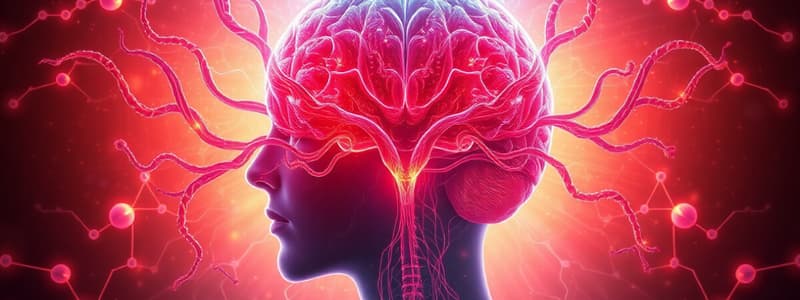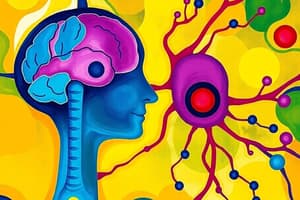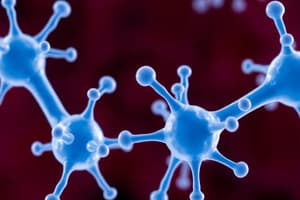Podcast
Questions and Answers
What hormone's analogs and antagonists are included in the pharmacological agents covered?
What hormone's analogs and antagonists are included in the pharmacological agents covered?
- Adrenocorticotropic hormone
- Insulin
- Thyroid hormone
- Growth hormone (correct)
Which of the following is not a GnRH analog or agonist?
Which of the following is not a GnRH analog or agonist?
- Goserelin
- Lutropin alfa (correct)
- Gonadorelin
- Leuprolide
Which of the following is an example of a prolactin regulator?
Which of the following is an example of a prolactin regulator?
- Cabergoline (correct)
- Conivaptan
- Octreotide
- Somatropin
In the context of adrenal insufficiency, which hormone deficiency might ACTH promote investigation for?
In the context of adrenal insufficiency, which hormone deficiency might ACTH promote investigation for?
Which of the following represents an ADH analog?
Which of the following represents an ADH analog?
What is the primary role of hypothalamic hormones in relation to the pituitary gland?
What is the primary role of hypothalamic hormones in relation to the pituitary gland?
Which class of drugs is used to stimulate growth hormone (GH) signaling?
Which class of drugs is used to stimulate growth hormone (GH) signaling?
What is a common condition associated with altered signaling of growth hormone?
What is a common condition associated with altered signaling of growth hormone?
What is the primary purpose of pharmacologic treatments related to the hypothalamic-pituitary axis?
What is the primary purpose of pharmacologic treatments related to the hypothalamic-pituitary axis?
What defines a super-agonist in the context of gonadotropin-regulating drugs?
What defines a super-agonist in the context of gonadotropin-regulating drugs?
Which of the following hormone treatments is used as a replacement therapy for hormone deficiency?
Which of the following hormone treatments is used as a replacement therapy for hormone deficiency?
What is one of the mechanisms of action for drugs that inhibit growth hormone signaling?
What is one of the mechanisms of action for drugs that inhibit growth hormone signaling?
Which of the following is true about water homeostasis-regulating drugs?
Which of the following is true about water homeostasis-regulating drugs?
What role do agonists at endogenous receptors play in medical treatments?
What role do agonists at endogenous receptors play in medical treatments?
What is a key pharmacokinetic consideration for gonadotropin-releasing hormones?
What is a key pharmacokinetic consideration for gonadotropin-releasing hormones?
Which hormone acts primarily via nuclear receptors to influence transcription in target cells?
Which hormone acts primarily via nuclear receptors to influence transcription in target cells?
What is the main purpose of antagonists used in endocrine treatments?
What is the main purpose of antagonists used in endocrine treatments?
What adverse effect might be associated with the use of stimulants for GH signaling?
What adverse effect might be associated with the use of stimulants for GH signaling?
Which class of hormones typically act via membrane receptors for rapid effects?
Which class of hormones typically act via membrane receptors for rapid effects?
What kind of abnormalities can be diagnosed using the ACTH stimulation test?
What kind of abnormalities can be diagnosed using the ACTH stimulation test?
Which hormone is primarily associated with the JAK/STAT signaling pathway?
Which hormone is primarily associated with the JAK/STAT signaling pathway?
What is the primary mechanism of action (MOA) of Leuprolide?
What is the primary mechanism of action (MOA) of Leuprolide?
Which of the following statements is true regarding Ganirelix?
Which of the following statements is true regarding Ganirelix?
What is the physiological effect of prolonged continuous administration of Leuprolide?
What is the physiological effect of prolonged continuous administration of Leuprolide?
In which clinical scenario is Oxytocin NOT typically indicated?
In which clinical scenario is Oxytocin NOT typically indicated?
What side effects are commonly associated with Leuprolide use?
What side effects are commonly associated with Leuprolide use?
Which GnRH analog may take up to four weeks to exert its clinical effects?
Which GnRH analog may take up to four weeks to exert its clinical effects?
What is the main therapeutic use of Vasopressin?
What is the main therapeutic use of Vasopressin?
Which factor primarily differentiates Relugolix from traditional GnRH super antagonists?
Which factor primarily differentiates Relugolix from traditional GnRH super antagonists?
What is a consequence of using growth hormone therapy in patients with acute critical illness?
What is a consequence of using growth hormone therapy in patients with acute critical illness?
Which condition is NOT a contraindication for growth hormone therapy?
Which condition is NOT a contraindication for growth hormone therapy?
In patients with growth hormone receptor mutations, what is the appropriate clinical use of Mecasermin?
In patients with growth hormone receptor mutations, what is the appropriate clinical use of Mecasermin?
What is the mechanism of action of Mecasermin?
What is the mechanism of action of Mecasermin?
Which of the following side effects is associated with Mecasermin?
Which of the following side effects is associated with Mecasermin?
Which neurotransmitter inhibits growth hormone signaling?
Which neurotransmitter inhibits growth hormone signaling?
What class of drugs would typically be used to inhibit GH signaling in cases of acromegaly?
What class of drugs would typically be used to inhibit GH signaling in cases of acromegaly?
What is the recommended route of administration for Mecasermin?
What is the recommended route of administration for Mecasermin?
Which hormone is used rarely as a diagnostic test for GH and GHRH sufficiency?
Which hormone is used rarely as a diagnostic test for GH and GHRH sufficiency?
What is the clinical use of Dopamine agonists such as bromocriptine?
What is the clinical use of Dopamine agonists such as bromocriptine?
Which hormone is currently not available for clinical use in the United States?
Which hormone is currently not available for clinical use in the United States?
What condition may be assessed using Gonadotropin-releasing hormone in a single dose?
What condition may be assessed using Gonadotropin-releasing hormone in a single dose?
For what purpose is Thyroid-stimulating hormone (TSH) primarily utilized?
For what purpose is Thyroid-stimulating hormone (TSH) primarily utilized?
Which hypothalamic hormone is specifically mentioned for use in pulses to treat GnRH deficiency-related infertility?
Which hypothalamic hormone is specifically mentioned for use in pulses to treat GnRH deficiency-related infertility?
Which hormone is rarely used to distinguish Cushing disease from ectopic ACTH secretion?
Which hormone is rarely used to distinguish Cushing disease from ectopic ACTH secretion?
What is a significant clinical use of long-acting analogs of Gonadotropin-releasing hormone?
What is a significant clinical use of long-acting analogs of Gonadotropin-releasing hormone?
Flashcards
What is ACTH?
What is ACTH?
A hormone secreted by the pituitary gland that stimulates the adrenal glands to produce cortisol.
What is adrenal insufficiency?
What is adrenal insufficiency?
A condition where the body doesn't produce enough cortisol, which is a crucial hormone for regulating blood sugar, blood pressure, and inflammation.
What is congenital adrenal hyperplasia?
What is congenital adrenal hyperplasia?
A group of genetic disorders affecting the adrenal glands, leading to an overproduction of certain hormones, usually androgens.
What is central adrenal insufficiency?
What is central adrenal insufficiency?
Signup and view all the flashcards
What is peripheral adrenal insufficiency?
What is peripheral adrenal insufficiency?
Signup and view all the flashcards
Hypothalamic-Pituitary Axis: Regulation of Anterior Pituitary Hormones
Hypothalamic-Pituitary Axis: Regulation of Anterior Pituitary Hormones
Signup and view all the flashcards
Hypothalamic-Pituitary Axis: Posterior Pituitary Hormones
Hypothalamic-Pituitary Axis: Posterior Pituitary Hormones
Signup and view all the flashcards
Hypothalamic-Pituitary Axis: Feedback Loops
Hypothalamic-Pituitary Axis: Feedback Loops
Signup and view all the flashcards
Growth Hormone (GH): Function
Growth Hormone (GH): Function
Signup and view all the flashcards
Growth Hormone (GH): Conditions
Growth Hormone (GH): Conditions
Signup and view all the flashcards
Growth Hormone (GH): Regulation
Growth Hormone (GH): Regulation
Signup and view all the flashcards
Growth Hormone (GH): Stimulating Drugs
Growth Hormone (GH): Stimulating Drugs
Signup and view all the flashcards
Growth Hormone (GH): Inhibiting Drugs
Growth Hormone (GH): Inhibiting Drugs
Signup and view all the flashcards
ACTH (Adrenocorticotropic Hormone)
ACTH (Adrenocorticotropic Hormone)
Signup and view all the flashcards
GPCR (G protein-coupled Receptor)
GPCR (G protein-coupled Receptor)
Signup and view all the flashcards
GHRH (Growth Hormone-Releasing Hormone)
GHRH (Growth Hormone-Releasing Hormone)
Signup and view all the flashcards
TRH (Thyrotropin-Releasing Hormone)
TRH (Thyrotropin-Releasing Hormone)
Signup and view all the flashcards
CRH (Corticotropin-Releasing Hormone)
CRH (Corticotropin-Releasing Hormone)
Signup and view all the flashcards
GnRH (Gonadotropin-Releasing Hormone)
GnRH (Gonadotropin-Releasing Hormone)
Signup and view all the flashcards
Dopamine
Dopamine
Signup and view all the flashcards
TSH (Thyroid-Stimulating Hormone)
TSH (Thyroid-Stimulating Hormone)
Signup and view all the flashcards
Hormonal Action
Hormonal Action
Signup and view all the flashcards
HPA Axis
HPA Axis
Signup and view all the flashcards
HPT Axis
HPT Axis
Signup and view all the flashcards
Hypothalamic-Pituitary Axis (HP) Targeting
Hypothalamic-Pituitary Axis (HP) Targeting
Signup and view all the flashcards
Hormone Replacement Therapy (HRT)
Hormone Replacement Therapy (HRT)
Signup and view all the flashcards
Hormone Antagonists
Hormone Antagonists
Signup and view all the flashcards
Nuclear Receptor Hormones
Nuclear Receptor Hormones
Signup and view all the flashcards
Membrane Receptor Hormones
Membrane Receptor Hormones
Signup and view all the flashcards
GH and 11-b HSD type 1
GH and 11-b HSD type 1
Signup and view all the flashcards
GH Contraindications in Critical Illness
GH Contraindications in Critical Illness
Signup and view all the flashcards
GH Contraindications in Cancer
GH Contraindications in Cancer
Signup and view all the flashcards
What is Mecasermin (Increlex)?
What is Mecasermin (Increlex)?
Signup and view all the flashcards
How is Mecasermin administered?
How is Mecasermin administered?
Signup and view all the flashcards
Mechanism of Action of Mecasermin
Mechanism of Action of Mecasermin
Signup and view all the flashcards
Treatment for GH Over-secretion
Treatment for GH Over-secretion
Signup and view all the flashcards
Somatostatin and Analogs for GH Inhibition
Somatostatin and Analogs for GH Inhibition
Signup and view all the flashcards
Super agonist (GnRH)
Super agonist (GnRH)
Signup and view all the flashcards
GnRH agonist flare
GnRH agonist flare
Signup and view all the flashcards
GnRH agonist downregulation
GnRH agonist downregulation
Signup and view all the flashcards
GnRH antagonist (e.g., Ganirelix)
GnRH antagonist (e.g., Ganirelix)
Signup and view all the flashcards
Preventing premature LH surge in COH
Preventing premature LH surge in COH
Signup and view all the flashcards
Oxytocin (Pitocin)
Oxytocin (Pitocin)
Signup and view all the flashcards
Vasopressin (ADH)
Vasopressin (ADH)
Signup and view all the flashcards
Vasopressin analogs
Vasopressin analogs
Signup and view all the flashcards
Study Notes
Endocrine Pharmacology: Hypothalamic & Pituitary
- This area focuses on hypothalamic and pituitary hormones.
- Control of metabolism, growth, and reproduction is done by the hypothalamus/pituitary system.
- Hypothalamus produces releasing hormones to stimulate or inhibit the pituitary.
- Pituitary responds by producing/releasing hormones which then influence specific endocrine tissues/glands.
- This influence produces a biological effect.
- Hypothalamus-Pituitary-Adrenal (HPA) axis, and Hypothalamus-Pituitary-Thyroid (HPT) axis are key examples.
Lecture Objectives - 1
- Explain hypothalamic & pituitary hormones with respect to:
- Stimulation & inhibition of anterior pituitary hormones.
- Secretion of posterior pituitary hormones.
- Tissue effects and subsequent hormone secretion.
- Conditions that arise from altered growth hormone signaling.
- Explain significant aspects of drugs in GH signaling:
- Drugs that stimulate GH signaling (rhGH and rhIGF-1).
- Drugs that inhibit GH signaling (SST analogs, pegvisomant).
- Mechanism of action and pharmacokinetics.
- Indications, contraindications, and adverse effects.
Lecture Objectives - 2
- Explain specifics of drugs regulating water homeostasis:
- Listing and differentiating agonists and antagonists.
- Mechanisms of action, pharmacokinetics, and structure-activity relationships (SAR).
- Indications, contraindications, and adverse effects.
- Explain specifics of gonadotropin regulating drugs:
- Listing/differentiating analogs, super-agonists, and antagonists.
- Mechanisms of action, pharmacokinetics, and SAR.
- Indications, contraindications, and adverse effects.
Hormone Receptors
- Hormones that act primarily through nuclear receptors modulate gene transcription in target cells (e.g., steroid hormones, thyroid hormone, vitamin D).
- Hormones acting through membrane receptors rapidly influence signal transduction pathways (e.g., peptide and amino acid hormones).
Classification of Hormones
- Based on structure and/or receptor type.
- Growth hormone (GH) and prolactin (PRL) are single-chain proteins with homology (JAK/STAT).
- TSH (thyrotropin), (FSH),(LH) (GPCR), (ACTH), a peptide precursor (GPCR).
Hypothalamus-Pituitary-Endocrine Axes
- Hypothalamus produces releasing factors, stimulating or inhibiting anterior pituitary hormone release.
- Pituitary releases trophic hormones, influencing various endocrine glands.
- Endocrine glands respond producing specific hormones that cause the biological effect.
Pharmacological Treatments
- Drugs treat endocrine disorders by regulating the hypothalamic-pituitary axis (HPA).
- Mimic or block endogenous hormones' actions.
- Uses include agonists at endogenous receptors (e.g., hormone replacement therapy), and antagonists to block excess hormones.
- Diagnostic tools for identifying endocrine abnormalities are included.
Drugs That Mimic or Block hypothalamic/pituitary Hormones
- Replacement therapy for hormone deficiencies.
- Antagonists for diseases caused by pituitary hormone excess.
Hormone Classifications
- Hormones are classified based on their structure and activated receptor type.
- Chain proteins are grouped together; single chain, proteins with homology, and others with similar receptors.
Regulation of Growth Hormone
- Growth hormone-releasing hormone (GHRH) acts on GPCRs (somatotropes), stimulating cAMP, which results in the production of growth hormone (GH)
- Somatostatin, acts on G protein-coupled receptors (GPCRs), and inhibits adenylate cyclase, K+ channels, and protein phosphatases.
- Dopamine, 5-HT, and α2-adrenergic agonists; ghrelin can also stimulate growth hormone secretion.
Growth Hormone
- Splice variants of endogenous GH differ from rhGH.
- About 50% of growth hormone circulates as a complex with a binding protein.
- GH can act as a reservoir and is cleared slowly.
- GH-induced secretion is pulsatile and high in children.
- GH-receptors are cytokine-type 3 receptors.
- Receptors dimerize after binding.
- Stimulates IGF-1 synthesis via JAK/STAT pathway.
Natural GH / IGF-1 Signaling Agonists
- 191 amino acids; 22.1 kDa.
- Binds to cell surface cytokine receptors (JAK/STAT).
- Anabolic effects on muscles, bones, and various organs.
- Reduces insulin sensitivity (t1/2 ~ 20–25 minutes).
- Insulin-like growth factor 1 (IGF-1) inhibits insulin secretion, promotes glucose production, and affects protein, cellular, and organ related growth.
- IGF-1 receptor tyrosine kinase is homologous to insulin receptors.
Increased GH Signaling Benefits
- Used to treat growth hormone deficiency in pediatric patients.
- Includes Prader-Willi syndrome, Turner syndrome, and idiopathic short stature (ISS).
- Also used in adults with growth hormone deficiency due to chronic wasting diseases (AIDS, HIV).
- Useful for conditions like short bowel syndrome, dependent on TPN, and severe burns.
Somatropin
- Recombinant human growth hormone 191 a.a.
- Agonist at GH receptors, promotes IGF-1 production.
- Absorbed slowly via SubQ or IM, with a duration of action of 18–20 hours.
- Possible side effects include abdominal pain, headache, peripheral edema, and nausea.
- Interactions can diminish hypoglycemic effects from anti-diabetic agents and inhibit the effect of 11-β HSD type 1.
Contraindications for Using Growth Hormone Therapy
- Patients with acute critical illnesses and postoperative complications.
- Multiple accidental traumas and acute respiratory failures.
- The use of growth hormone in patients with preexisting neoplasms or malignancies, proliferative retinopathy has been associated with increased mortality..
Mecasermin
- Non-responsive to exogenous GH therapy; GH receptor mutations or neutralizing GH antibodies are present.
- Doses of 0.4-0.8 mg/kg subcutaneously twice a day, with intake around 20 minutes prior to mealtime.
- The drug's MOA is to act as an agonist at IGF-1 receptors in the liver, bone, etc.
- The half-life is 6 hours.
- Side effects include hypoglycemia and lipohypertrophy.
Inhibition of Growth Hormone Release
- Surgery is often the initial treatment for excess GH secretion.
- Medical intervention is necessary with large adenomas or persistent GH secretion.
- Neurotransmitters, including somatostatin, regulate GH signaling.
Somatostatin (SST) and Synthetic Analogs
- Cyclic peptide (14 amino acids).
- Four residues (#7–10) critical for activity.
- Binds to SST receptors preventing GH release (SSTR1, 2, 3, 4, 5.).
- Analogs are designed for increased half-life and specificity.
- Includes octreotide and lanreotide.
Octreotide
- Modified octapeptide SST analog.
- Doses of 100 mcg SubQ or IM three times per day or 20 mg IM depot every four weeks.
- MOA: an agonist at somatostatin receptors, inhibiting GH release through actions on cAMP, K+ channels and pTYR.
- 25 times more potent than somatostatin.
- Possible side effects are diarrhea, nausea, abdominal pain, biliary sludge, cholelithiasis, sinus bradycardia, and hypothyroidism.
Lanreotide
- Modified octapeptide SST analog.
- Dose of 90 mg SubQ depot once per month.
- MOA: an agonist at SSTR-2 and -5 receptors, inhibiting GH release.
- Half-life of 23–36 days.
- Side effects similar to octreotide, including bradycardia, hypertension and hypo- or hyperglycemia.
Pegvisomant
- Pegylated peptide; competitive antagonist at GH receptors.
- Binds one receptor site; higher affinity, but not the second dimerization site.
- Dose of 10 mg subcutaneously once daily.
- Half-life of 3–6 days.
- Side effects may include elevated liver function tests (LFTs), neutralizing antibodies, diarrhea, nausea and altered glucose metabolism .
Regulation of Prolactin (i.e., Lactation)
- Prolactin is the only anterior pituitary hormone not directly regulated via stimulatory control. Essentially constitutively active.
- Dopamine inhibits prolactin release via D₂ receptors.
- TRH can stimulate prolactin release.
- Prolactin levels remain low in males and increase during the menstrual cycle in females.
Reducing Prolactin Signaling
- Prolactin is produced by the anterior pituitary and induces lactation.
- High prolactin levels inhibit ovulation.
- Prolactinomas are associated with hyperprolactinemia and may result in hypogonadism and infertility.
- Visual disturbances, associated with the tumor mass, and acromegaly may occur in high dose conditions.
- Dopamine receptor agonist like bromocriptine may be used to reduce prolactin secretion.
Bromocriptine
- Used for hyperprolactinemia, hypogonadism, and acromegaly.
- Slightly selective D₂ receptor agonist.
- Extensive first-pass metabolism via CYP3A4.
- Half-life of 5–6 hours.
- Common side effects include orthostatic/postural hypotension, nausea, and vomiting.
Cabergoline
- Used for hyperprolactinemia, arising from pituitary adenomas.
- Highly selective D₂ receptor agonist, metabolized via hepatic hydrolysis.
- Half-life is 65 hours.
- Side effects include headache, dizziness, nausea, and orthostatic hypotension, and less severe nausea/vomiting.
- Interactions with β-adrenergic agonists and anti-psychotics should be considered.
Regulation of Gonadotropin Hormones
- Luteinizing hormone (LH), follicle-stimulating hormone (FSH), and human chorionic gonadotropin (hCG) regulate various reproductive processes.
GnRH Signal Gonadotropin Hormone Analogs
- Used for follicle development, ovulation, male infertility, and prepubertal cryptorchidism.
- Includes follitropin alpha, follitropin beta, urofollitropin, lutropin alpha, menotropins, choriogonadotropin alpha, and choriogonadotropin.
Urofollitropin (Bravelle)
- Purified FSH from menopausal women's urine.
- Administered Subcutaneously or Intramuscularly.
- Used for follicle development.
- Requires hCG for ovulation.
- Contraindicated in pregnancy.
Follicle Stimulating Hormone (FSH), Follistin
- Recombinant FSH from CHO cells.
- Purified by immunochromatography using FSH antibodies.
- Agonist at FSH receptors.
- Used for controlled ovulation and ovarian hyperstimulation.
- Associated side effects include headache, depression, edema, ovarian hyperstimulation syndrome (OHSS), and multiple pregnancies.
Luteinizing Hormone Analogs
- Lutropin alpha; a recombinant LH used for follicular development in conjunction with follitropin.
- Can induce androgen secretion.
- Essentially equivalent cautions to FSH analog cautions during pregnancy.
Human Chorionic Gonadotropin (hCG)
- Endogenous LH analog.
- Used to initiate ovulation, manage ovarian follicle development in women with hypogonadism, or stimulate gonadal steroid production in men.
- Administered via injection.
- Side effects include headache, depression, edema, ovarian hyperstimulation syndrome (OHSS), and possible multiple pregnancies in women and gynecomastia in men.
Inhibting GnRH Signaling
- GnRH receptor super agonists (gonadorelin, goserelin, histrelin, leuprolide, nafarelin, and triptorelin) and GnRH receptor antagonists (ganirelix, cetrorelix, and degarelix) are used to inhibit GnRH signaling, causing gynecomastia in males; depression and reduced libido; and contraindications during pregnancy and breast-feeding.
GnRH Analogs
- Synthetic human GnRH (gonadorelin) and its analogs (goserelin, histrelin, nafarelin, and triptorelin) are used clinically to treat conditions. Includes similar mechanisms, physiological effects, clinical indications, and side effects to endogenous GnRH.
GnRH Superagonists
- Gonadorelin, goserelin, histrelin, leuprolide, nafarelin, and triptorelin are synthetic/modified.
- GnRH analogs and super agonists have increased half-lives and are potent.
- Constant administration results in downregulation of GnRH receptors.
- Reductions in LH/FSH and gonadal steroids occur.
Leuporlide
- MOA: agonist at GnRH receptors
- Physiological effects: increased LH and FSH secretion initially, but then decrease when continuously administered.
- Administration routes: intravenous (IV), subcutaneous (SubQ), intramuscular (IM), and intranasal.
- Side effects associated with this administration can include headache, nausea, lightheadedness, and injection site reactions, as well as hypogonadism with continuous use.
Ganirelix
- GnRH antagonist that blocks GnRH receptor binding., resulting in lost activity, decreased endogenous LH and FSH production and decreased downstream gonadal steroids.
- Used for controlled ovarian hyperstimulation during controlled stimulation.
- Ganirelix acts in 5 days, whereas other similar agents require additional time.
Posterior Pituitary Hormones
- Vasopressin analogs and antagonists, and oxytocin are produced by the hypothalamic neuronal cell bodies and transported to the posterior pituitary via neuronal axons.
- Posterior Hormones regulate fluid balance through V₁ and V₂ receptors, influencing vasoconstriction and water reabsorption via the aquaporin channels.
Oxytocin
- A nine-amino acid peptide.
- Works by acting as an agonist at oxytocin receptors to cause contractions of the uterus and stimulation of lactation.
- Clinically used for labor induction/augmentation, and to control uterine hemorrhage and other conditions.
- Side effects include fluid retention and hypotension.
Arginine Vasopressin
- A nonapeptide responsible for water balance in the body.
- Administered either intravenously (IV) or intramuscularly (IM).
- Affects the vasculature by causing vasoconstriction and increasing arterial pressure.
- Increases water reabsorption via upregulation of aquaporin channels.
- Deficiency in this peptide can cause diabetes insipidus.
Desmopressin
- Synthetic peptide analog.
- Relates to vasopressin.
- Relatively selective V₂ receptor agonist; causes a decreased excretion of water in the kidneys.
- Also increases factor VIII and von Willebrand factor (VWF).
- Administered orally, intravenously (IV), subcutaneously (SubQ), or intranasally.
Conivaptan
- V₁a/V₂ receptor antagonist.
- Oral use is not recommended, because of lower bioavailability.
- The main use is intravenous infusion.
- Side effects can include infusion site reactions.
- Also blocks the effects of excess vasopressin.
Hypothalamus and Pituitary Endocrine Pearls
- Peptide hormones affect growth, development, reproduction, response to stress, and metabolic processes.
- Hypothalamic hormones influence synthesis and secretion of pituitary hormones.
- Growth hormone's primary effect is bone development.
- Excess GH is treated with somatostatin analogs (e.g., octreotide).
- Deficiency in GH is treated with recombinant human growth hormone (e.g., somatropin).
- GnRH analogs are used to treat advanced prostate cancer.
- Diuresis is regulated by vasopressin analogs/antagonists.
Hypothalamic-Pituitary Organ Pathways
- The hypothalamic-pituitary system controls various bodily functions through specific hormones influencing particular organs.
- These hormones regulate growth, thyroid function, adrenal cortex function, and gonads, and milk production.
Studying That Suits You
Use AI to generate personalized quizzes and flashcards to suit your learning preferences.




